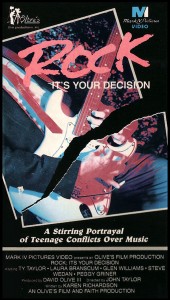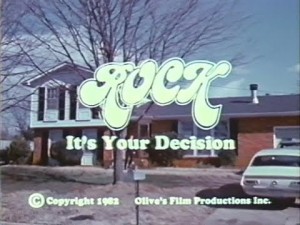
“Rock: It’s Your Decision” is like being in a debate in which you’re a mute and you can’t defend yourself. The film takes the stance that rock music is satanic and that it’s perverting the minds of good, wholesome Christians. To prove this point, the film centers around Jeff, a typical Christian teenager who’s been going through a rebellious stage; director John Tayler & screenwriter Karen Richardson’s idea of rebellion being storming off to church after your mother harasses you about your rock music. Jeff’s mother grows worried about her son’s mental state and asks Pastor Owens to talk with her son, to which he agrees. Unfortunately, this isn’t Pastor Kevin Owens and he doesn’t punish Jeff’s “devilish” attitude by Pop-Up Powerbombing him (it worked on Machine Gun Kelly).
Pastor Owens initially seems like the audience’s voice of reason, as he partially blames Jeff’s recent attitude on his parents’ treatment of him. Owens feels that Jeff is lashing out simply because his parents disapprove of his rock music, despite not knowing anything about it (keep that in mind). Owens also argues that one could make the case that the soap operas in which the parents love could be made out to be satanic (keep that in mind, as well). The pastor’s solution to this problem is to have Jeff swear off rock music for two weeks and do research on the subject matter and draw his own conclusion. Actually, let me correct that statement: what Pastor Owens says is that Jeff must leave his personal opinion at the door and attack rock music from a Christian moral standpoint and that, if he still wants to defy God after two weeks, he may do just that. Just as I was beginning to like Pastor Owens…

Within two weeks, Jeff goes from likable and respectful teenager to religious zealot. He starts preaching to his friends and classmates about the evils of rock music and how they must be saved by the power of Christ. Jeff breaks a promise to his girlfriend to take her to a rock concert (which one could argue is a sin), then forces both her and his friend to partake in his research; whenever one of them tries to debate the topic with Jeff, he casts them out as a sinner. At one point, he storms out of a party because they’re playing rock music and that goes against his newfound beliefs. I’ll give Jeff the benefit of the doubt that he was partially set up to attend that party, but he has to be more accepting of others’ personal beliefs instead of cramming his down their throat. The bible just preach tolerance, after all.
Jeff, after storming home from the party in a fit of rage and rebelling against rock music by listening to rock music (it doesn’t make any sense to me either), calls his mother out for her hypocrisy in criticizing rock music whilst watching soap operas that promote sex, then leaves to get advice from Pastor Owens. The pastor regales his plight of being casted out by his friends for becoming a Christian. It’s at this point that I realize just how much this film needs another voice of reason, as I was begging for someone to point out that it’s possible the reason Jeff and Pastor Owens have been chastised by others isn’t for their religious beliefs, but in the way in which they promote it. It’s during this heart-to-heart that Jeff realizes that rock music is a sin and that he not only needs to save his soul, but everybody else’s, as well.

The finale to “Rock: It’s Your Decision” is where the film feels like a one-sided debate the most. Jeff gathers the town together to attend a speech of his on the evils of rock music. In this speech, Jeff relates rock music to being controlled, as those who attend the concerts are brainwashed into swaying and clapping along to the beat. Jeff surveyed teenagers and discovered that the lyrics don’t matter to them, just the music, which means they’re being fed subliminal messages. In his closing statement, Jeff lambastes rock musicians for having songs with titles about sex, violence, and Satanism, and picks apart their personal lifestyles (including a random bout of homophobia that came out of left field). All of these points can be argued against, but we’re never given another voice of reason. I understand that Jeff was giving a speech, not a debate, but even speeches involve a Q&A, which Jeff never grants his audience.
Since the film never featured a voice of reason, I’ll be that voice of reason and debate Jeff. Arguing that swaying and clapping to music is like being controlled by Satan is ludicrous, as all it proves is that people are enthusiastically enjoying a song. If Jeff wants to use that argument, then I’d like to argue that church masses also control people, as everybody sways and claps to the choir and is then brainwashed by the sermon. Most would view that argument as asinine, despite it being the same argument as Jeff’s, simply replacing rock music with church. As for teenagers not caring about the lyrics, that only validates the belief that it’s the music itself that they’re interested in and not the message. Jeff tries to argue that teenagers will be so entranced by the music that they’ll fall in line to the subliminal lyrics (which aren’t subliminal if they’re blatant, by the way), but none of the teenagers who listen to rock music in this community adhere to the lyrics. Jeff calls out the seedy lifestyles of rock musicians as a bad influence on the youth, but none of the youth he’s preaching to do drugs, drink alcohol, or engage in sexual intercourse, making his point moot.

Finally, and this is the biggest ignorance committed in this film of all, I’d like to address Jeff’s lousy research into rock music. Jeff brings up satanic and sexual song titles, but never actually researches the lyrics or the song’s intent; therefore, I’ll do so. Santana’s “Evil Ways” isn’t about partaking in evil ways, but changing them; Jefferson Starship’s “Dance with the Dragon” is about the Chinese Year of the Dragon, not a satanic dragon (making Jeff’s argument also kind of racist); The Rolling Stone’s “Sympathy for the Devil” is written from Satan’s perspective and is about his responsibility for historical atrocities; and AC/DC’s “Hell Ain’t a Bad Place to Be” is actually a metaphor about a man being tormented by his adultery, not accepting Hell as a welcoming place. I’m surprised Jeff didn’t call out The Doobie Brothers’ “Jesus is Just Alright” for claiming our lord and savior is anything less than perfect.
The reason I loathed “Rock: It’s Your Decision” isn’t because I disagree with its viewpoints, but because it goes about them in such a haphazard way. Taylor & Richardson make no attempt at providing both viewpoints, crushing the “rock is alright” alignment early on. Instead, the duo provides a narcissistic and preachy protagonist that looks down at everybody and fails to do even the slightest bit of research that doesn’t support his argument. The film inadvertently makes it seem as if Christianity brainwashes people and turns them into self-righteous jerks, which is the complete opposite of its goal. This is a problem many Christian propaganda films (and propaganda films in general) suffer from, and “Rock: It’s Your Decision” suffers from this greatly.
Final Rating: F
